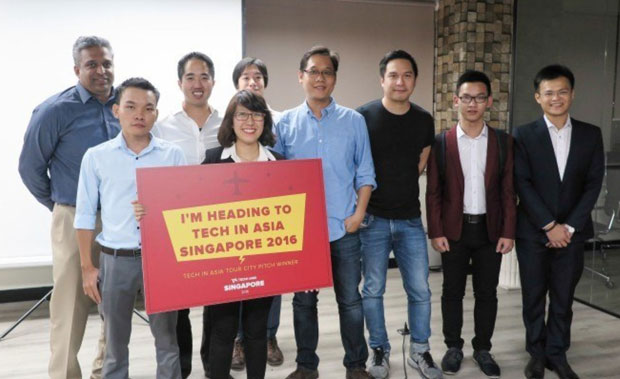Da Nang and Singapore share similarities in start-up activities
During his recent meeting with some start-up businesspeople from the Da Nang Entrepreneurship Support Company Ltd (DNES), the former Director of the Start-up Grind Singapore, Mr Le Thanh Son, affirmed that Da Nang and Singapore share many similarities in their initial start-up activities.
 |
| The AntBuddy project team from Da Nang at the Tech in Asia Singapore 2016 event in April |
Mr Son said, “Singapore was considered one of the most ideal destinations for Asian start-ups between 2009 and 2010 with over 1,000 start-up businesses. In addition, the island country has been listed amongst the world’s top 10 best start-up ecosystems, according to Compass’s Start-up Ecosystem Rankings 2015 report.”
He revealed that the Singaporean government plays a vital role in promoting the development of its start-up activities. In particular, over 10 national-level agencies exist to assist local start-ups. Included are the Agency for Science Technology and Research (A*STAR), the Action Community for Entrepreneurship (ACE), and the National Research Foundation (NRF). In addition, the Singaporean government has issued numerous preferential policies for local start-ups. Included are reducing taxes for angel investors, setting up funds for newly-established businesses, and launching technological incubator programmes. In particular, Singaporean Prime Minister Lee Hsien Loong launched a campaign in November 2014 to turn Singapore into a ‘smart’ country.
Da Nang is also implementing a project to develop itself into a 'smart city' over the 2016 - 2020 period with the intention of promoting information technology (IT) applications in its administration, education and healthcare systems.
Numerous incentives have been issued by the city authorities to boost local start-up activities in 2015 and 2016. Most notably, a business development strategy towards 2020 with a vision to 2030 has been developed. DNES’s Start-up Fund, and some start-up clubs in local universities, have been established.
In early October, DNES opened its Da Nang Co-working Space (DNC) for local start-up businesses at 31 Tran Phu. This offers a creative and dynamic working environment for young start-up businesspeople.
However, both Singapore and Da Nang are now facing workforce shortages. Mr Jonathan Chua, co-founder cum CEO of Gradient which is an education technology start-up in Singapore, highlighted that Singapore is predicted to lack around 30,000 IT employees by 2020. He underlined that many businesses begin their start-up activities in Singapore, but many of them then soon move their operations to other countries. The main reason seems to be that Singapore has a small area and a small population, so start-up businesses face many difficulties when they test their products and analyse the market’s reaction.
Da Nang is also facing the same problem. Ms Ha Thanh An, developer of the AntBuddy start-up project, said that her team have to test their products in Ho Chi Minh City to collect opinions from customers because the southern city is more bustling than Da Nang. Like AntBuddy, other similar cases may make Da Nang suffer from a start-up brain drain.
Mr Le Thanh Son, therefore, stressed the need for the Da Nang authorities to issue even more practical incentive policies for local start-up businesses in order to encourage them to operate in the city long term.